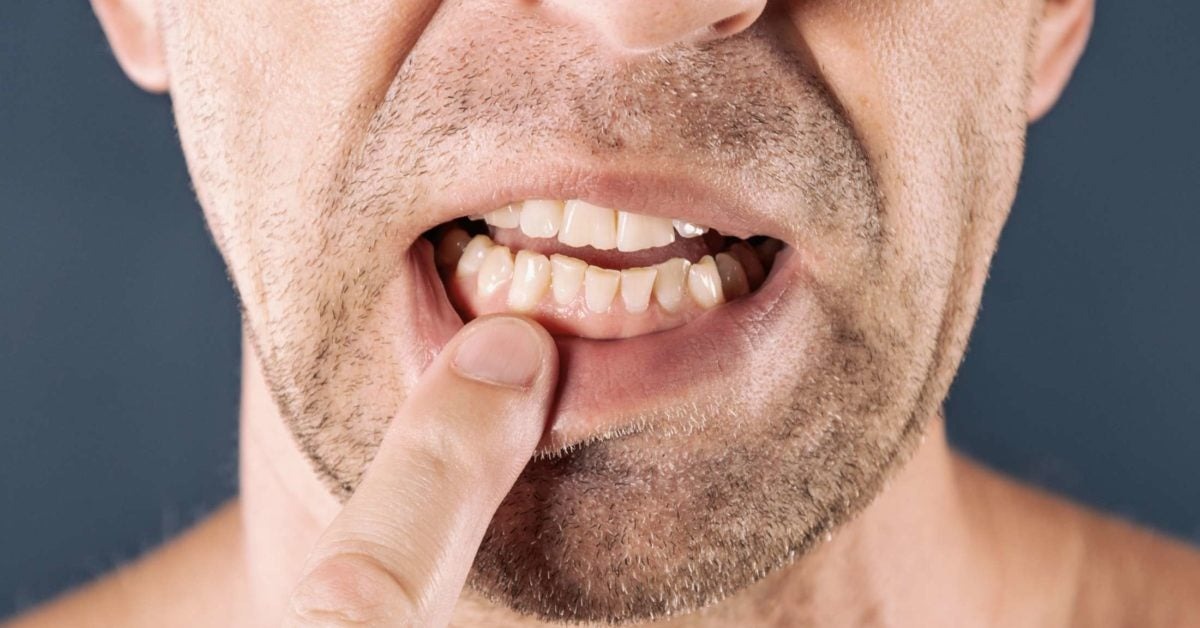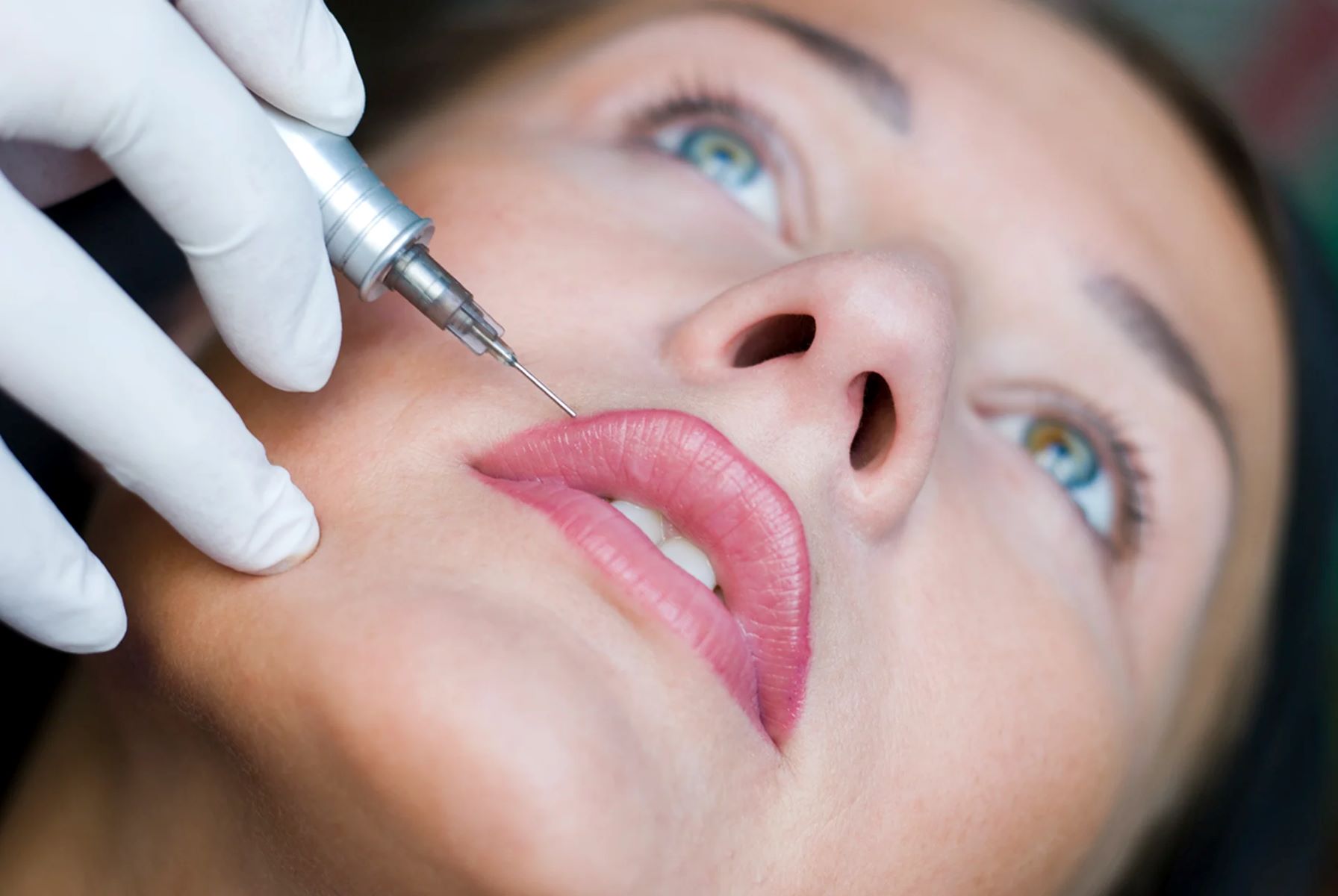

Featured
How To Improve Gum Health Quickly
Published: September 14, 2023
Discover effective ways to improve gum health quickly. Learn about featured techniques and tips to maintain healthy gums for a beautiful smile.
Introduction
Gum health is an essential aspect of overall oral health that is often overlooked. While many people focus on brushing their teeth regularly, they may neglect the health of their gums. However, maintaining healthy gums is crucial, as gum diseases can lead to serious dental problems if left untreated.
When it comes to gum health, prevention is key. By adopting effective oral hygiene practices and making simple lifestyle changes, you can significantly improve the health of your gums. In this article, we will explore various strategies to improve gum health quickly and effectively.
Before we delve into the specifics of improving gum health, it’s important to understand the role that gums play in our oral health. Gums, also known as gingiva, surround and support our teeth. Healthy gums are firm, pink, and fit snugly around each tooth, forming a protective seal. They act as a barrier, preventing bacteria from entering the deeper tissues of the mouth.
Poor gum health, on the other hand, can result in various gum diseases, such as gingivitis and periodontitis. These conditions can cause gum inflammation, bleeding, receding gums, and ultimately, lead to tooth loss if not properly addressed.
There are several factors that contribute to poor gum health. Poor oral hygiene, excessive plaque and tartar buildup, hormonal changes, smoking, certain medications, genetic predisposition, and underlying health conditions can all increase the risk of gum diseases. It’s essential to be aware of these factors and take proactive steps to improve and maintain gum health.
Improving gum health is not only essential for a beautiful smile but also crucial for maintaining overall oral health and preventing serious dental problems. Healthy gums provide a sturdy foundation for strong teeth, helping to prevent tooth decay, sensitivity, and tooth loss.
By implementing effective oral hygiene practices, adopting a healthy diet, quitting harmful habits, and seeking regular dental care, you can significantly improve the health of your gums. In the following sections, we will explore these strategies and provide practical tips to help you quickly improve and maintain gum health.
Understanding Gum Health
Gum health refers to the condition of the gums, or gingiva, that surround and support our teeth. Healthy gums are firm, pale pink in color, and fit snugly around each tooth. They act as a protective barrier, preventing bacteria from entering the deeper tissues of the mouth.
When the gums are healthy, they provide support to the teeth and help maintain their stability. However, poor gum health can lead to gum diseases, such as gingivitis and periodontitis, which can have serious consequences if left untreated.
Gingivitis is the mildest form of gum disease. It occurs when plaque, a sticky film composed of bacteria and food particles, accumulates along the gum line and causes inflammation. Symptoms of gingivitis include redness, swelling, and bleeding while brushing or flossing.
If left untreated, gingivitis can progress to periodontitis, a more severe form of gum disease. Periodontitis is characterized by the destruction of the gum tissue and the supporting structures of the teeth, leading to deep periodontal pockets, receding gums, and even tooth loss.
Understanding the early signs of gum disease is crucial in preventing its progression and maintaining optimal gum health. Regular dental check-ups can help identify and address any signs of gum disease early on, ensuring prompt intervention and treatment.
Factors that can contribute to poor gum health include poor oral hygiene, plaque and tartar buildup, hormonal changes, smoking, certain medications, genetic predisposition, and underlying health conditions such as diabetes or immunodeficiency disorders.
It’s important to note that poor gum health not only affects the oral cavity but can also have implications for overall health. Research has found associations between gum disease and various systemic conditions, including heart disease, diabetes, respiratory infections, and even certain types of cancer.
Therefore, maintaining healthy gums is not only crucial for a beautiful smile but also for the overall well-being of the body. By understanding the nuances of gum health and taking proactive steps to prevent gum disease, you can ensure the stability and longevity of your oral health.
Causes of Poor Gum Health
There are multiple factors that can contribute to poor gum health and increase the risk of gum diseases. Understanding these causes is essential in order to effectively address and improve gum health. Here are some common causes:
1. Poor Oral Hygiene: Inadequate brushing and flossing can lead to the buildup of plaque, a sticky film of bacteria and food particles that irritate the gums and cause inflammation.
2. Plaque and Tartar Buildup: When plaque is not removed through proper oral hygiene practices, it hardens into tartar, which cannot be removed with regular brushing and flossing. Tartar buildup along the gum line leads to gum irritation and disease.
3. Hormonal Changes: Hormonal fluctuations during puberty, pregnancy, and menopause can make the gums more sensitive and prone to inflammation. This puts individuals at a higher risk of developing gum disease.
4. Smoking and Tobacco Use: Tobacco products contain harmful chemicals that can damage the gums and adversely affect oral health. Smoking weakens the immune system and impedes the ability of the gum tissue to heal, making smokers more susceptible to gum disease.
5. Medications: Certain medications, such as oral contraceptives, antidepressants, and certain heart medications, can cause dry mouth, reducing the production of saliva. Saliva plays a crucial role in protecting the gums and teeth from bacteria and infection.
6. Genetic Predisposition: Some individuals may have a genetic predisposition to gum diseases. These individuals may experience more significant gum problems even with proper oral hygiene practices.
7. Underlying Health Conditions: Medical conditions like diabetes, immune system disorders, and certain infections can compromise gum health and increase the risk of gum disease.
8. Stress: High levels of stress can weaken the immune system and make individuals more susceptible to gum infections and disease.
9. Poor Nutrition: A diet lacking in essential nutrients can weaken the immune system and impair gum health, making it more difficult for the gums to resist infection and inflammation.
It’s important to note that these factors are not mutually exclusive, and multiple factors often contribute to poor gum health. By addressing these causes and implementing appropriate preventive measures, it is possible to improve gum health and reduce the risk of gum diseases.
Importance of Improving Gum Health
Improving gum health is not just about having a confident smile and fresh breath; it plays a crucial role in maintaining overall oral health and preventing serious dental problems. Here are some key reasons why improving gum health is essential:
1. Preventing Gum Diseases: Effective gum care helps prevent gum diseases such as gingivitis and periodontitis. These conditions can lead to gum inflammation, bleeding, receding gums, and eventually tooth loss if left untreated. By improving gum health, you can minimize the risk of developing these conditions.
2. Maintaining Strong Teeth: Healthy gums provide a firm and stable foundation for the teeth. When the gums are weak or infected, they may fail to adequately support the teeth, leading to tooth looseness and eventual tooth loss. By improving gum health, you can help maintain the longevity and strength of your teeth.
3. Preventing Tooth Decay: Gum diseases can create pockets between the gums and teeth, allowing bacteria to accumulate and contribute to tooth decay. By improving gum health, you can minimize the risk of decay and cavities.
4. Reducing Sensitivity: Gum recession, often caused by poor gum health, can expose the sensitive root surfaces of the teeth, leading to increased tooth sensitivity to hot, cold, and sweet stimuli. By improving gum health, you can help reduce tooth sensitivity and improve overall oral comfort.
5. Preventing Bad Breath: Poor gum health is often associated with bad breath or halitosis. This is due to the presence of bacteria and infection in the gums. By improving gum health and promoting a clean oral environment, you can effectively combat bad breath.
6. Improving Overall Health: Research has linked gum disease to various systemic conditions, including heart disease, diabetes, respiratory infections, and certain types of cancer. By improving gum health, you can potentially reduce the risk of developing these conditions and contribute to overall well-being.
7. Enhancing Self-Confidence: Healthy gums contribute to a confident smile. When your gums are healthy and free from inflammation, you can smile and speak with confidence, improving your self-esteem and overall quality of life.
8. Reducing Dental Costs: Maintaining good gum health can help prevent the need for costly dental treatments down the line. By spending a little time and effort on improving gum health now, you can potentially save yourself from expensive dental procedures in the future.
Improving gum health is a vital aspect of maintaining optimal oral health and preventing serious dental issues. By implementing effective oral hygiene practices, adopting a healthy lifestyle, and seeking regular dental care, you can significantly improve your gum health and enjoy the benefits of a healthy smile.
Effective Oral Hygiene Practices
Adopting effective oral hygiene practices is crucial for maintaining optimal gum health. Proper oral hygiene helps remove plaque, bacteria, and food particles from the teeth and gums, reducing the risk of gum diseases and other dental problems. Here are some essential oral hygiene practices to follow:
1. Brushing Twice a Day: Brush your teeth thoroughly with a soft-bristled toothbrush at least twice a day. Use gentle, circular motions and pay attention to all surfaces of the teeth, including the gumline. Replace your toothbrush every three to four months or sooner if the bristles become frayed.
2. Use a Fluoride Toothpaste: Choose a toothpaste that contains fluoride, as it helps strengthen the enamel and protects against tooth decay. Fluoride also has antimicrobial properties that can help combat bacteria in the mouth.
3. Proper Brushing Technique: Angle the toothbrush at a 45-degree angle towards the gumline and brush with gentle, circular motions. Be thorough and spend at least two minutes brushing your teeth.
4. Don’t Forget to Brush Your Tongue: Bacteria can accumulate on the surface of the tongue, leading to bad breath. Use a tongue scraper or your toothbrush to gently clean your tongue and remove bacteria.
5. Floss Daily: Flossing is essential for removing plaque and food particles from between the teeth and along the gumline. Use a gentle back-and-forth motion to clean each side of the tooth and go beneath the gumline. If traditional flossing is challenging, consider using floss picks or water flossers.
6. Choose the Right Toothbrush: Select a toothbrush with soft bristles that can effectively clean the teeth without causing irritation to the gums. A small-headed toothbrush allows better access to hard-to-reach areas of the mouth.
7. Use a Mouthwash: Rinse with an antimicrobial mouthwash after brushing and flossing to help kill bacteria and freshen your breath. Look for mouthwashes that have the American Dental Association (ADA) seal of approval.
8. Don’t Overbrush: Avoid aggressive brushing as it can damage the gums and tooth enamel. Brushing too hard or with a toothbrush with hard bristles may cause gum recession and tooth sensitivity. Be gentle yet thorough when brushing.
9. Practice Proper Technique: Teach children proper brushing and flossing techniques from an early age to set them up for a lifetime of good oral hygiene habits.
10. Stay Consistent: Be consistent with your oral hygiene routine. Regular daily brushing, flossing, and mouthwash use are essential for maintaining gum health.
By following these effective oral hygiene practices, you can remove plaque, reduce the risk of gum diseases, and maintain optimal gum health. Remember to consult with your dentist or dental hygienist for personalized advice and recommendations on oral care specific to your needs.
Daily Gum Care Routine
Establishing a daily gum care routine is crucial for maintaining optimal gum health. Consistent and proper care can help keep your gums clean and free from infection. Here are some steps to include in your daily gum care routine:
1. Brush Your Teeth Twice a Day: Brush your teeth for at least two minutes using a soft-bristled toothbrush. Use a gentle circular motion and make sure to brush along the gumline to remove plaque and bacteria.
2. Floss Daily: Flossing is essential for removing plaque and debris from between the teeth and along the gumline. Use a gentle back-and-forth motion and curve the floss around each tooth, going beneath the gumline to remove any trapped bacteria or food particles.
3. Use an Antimicrobial Mouthwash: Rinse your mouth with an antimicrobial mouthwash after brushing and flossing. This can help kill bacteria, freshen your breath, and reduce the risk of gum disease. Look for a mouthwash that has the ADA seal of approval.
4. Scrape Your Tongue: Use a tongue scraper or the back of your toothbrush to gently clean your tongue. This helps remove bacteria, food debris, and dead cells that can contribute to bad breath and bacterial growth.
5. Drink Plenty of Water: Drinking water throughout the day helps flush away bacteria and food particles and promotes saliva production. Saliva is essential for maintaining a healthy oral environment.
6. Chew Sugar-Free Gum: Chewing sugar-free gum after meals can stimulate saliva flow, which helps wash away food particles and neutralize acids that can harm your teeth and gums. Look for gum that contains xylitol, as it has been shown to have dental benefits.
7. Avoid Smoking and Tobacco Use: Smoking and using tobacco products can damage your gums and increase your risk of gum disease. Quitting or avoiding these habits can significantly improve your gum health.
8. Limit Sugary and Acidic Foods: Sugary and acidic foods can contribute to tooth decay and gum problems. Limit your intake of sugary snacks, soft drinks, and acidic beverages to protect your gums and teeth.
9. Stay Hydrated: Proper hydration is important for maintaining overall oral health. Drinking enough water helps keep your gums hydrated and prevents dry mouth, which can lead to gum irritation and infection.
10. Get Regular Dental Check-ups: Regular dental check-ups are essential for maintaining gum health. Your dentist can detect any signs of gum disease, provide professional cleaning, and offer personalized advice on improving your gum health.
By incorporating these daily gum care habits into your routine, you can protect your gums from infection, maintain fresh breath, and promote overall oral health. Remember, consistency is key, so make a commitment to prioritize your gum health every day.
Choosing the Right Toothbrush and Toothpaste
Choosing the right toothbrush and toothpaste is essential for maintaining optimal gum health and oral hygiene. With the wide variety of options available, it’s important to understand the factors to consider when making these choices. Here are some tips to help you choose the right toothbrush and toothpaste:
Choosing the Right Toothbrush:
– Bristle Type: Opt for a toothbrush with soft bristles. Hard or medium bristles can be too harsh and cause gum irritation or enamel abrasion.
– Size: Choose a toothbrush with a head small enough to reach all areas of your mouth, including the back teeth. This ensures effective cleaning and maneuverability.
– Handle: Look for a toothbrush with a comfortable, non-slip grip. This allows for greater control and ease of use while brushing.
– Electric or Manual: Both electric and manual toothbrushes can be effective when used correctly. Electric toothbrushes, however, can provide additional benefits, such as better plaque removal, timer features, and ease of use for individuals with limited dexterity.
Choosing the Right Toothpaste:
– Fluoride Content: Opt for a toothpaste that contains fluoride. Fluoride helps strengthen tooth enamel, reducing the risk of cavities and tooth decay. Look for the American Dental Association (ADA) seal to ensure its effectiveness.
– Specific Concerns: Consider any specific dental concerns or needs you may have. For example, if you have sensitive teeth, look for toothpaste specifically designed for that purpose.
– Taste and Texture: Choose a toothpaste with a flavor and texture that you find pleasant. This can encourage consistent brushing and make the experience more enjoyable.
– Anti-Plaque or Tartar Control: If you are prone to plaque buildup or have a higher risk of tartar formation, consider toothpaste with anti-plaque or tartar control properties.
– Whitening Agents: If you desire a brighter smile, you may opt for a toothpaste with whitening agents. These toothpaste options can help remove surface stains and give your teeth a brighter appearance.
Remember to replace your toothbrush every three to four months or sooner if the bristles become frayed. Regularly update your toothpaste selection to address any changing dental needs or concerns.
It’s also important to consult with your dentist or dental hygienist for personalized recommendations. They can provide guidance based on your specific oral health needs and help you choose the toothbrush and toothpaste that will best support your gum health and overall oral hygiene.
Flossing Techniques
Flossing is an essential part of maintaining optimal gum health and preventing gum diseases. It helps remove plaque and food particles from between the teeth and along the gumline, where toothbrush bristles cannot reach. Here are some key techniques to ensure effective and proper flossing:
1. Choose the Right Floss: There are various types of dental floss available, including nylon floss, waxed floss, and floss picks. Choose the type that feels comfortable and works best for you. It’s more important to floss consistently than to worry about which type to use.
2. Use Enough Floss: Take about 18 inches (45 cm) of floss and wrap most of it around your middle fingers, leaving a short section to work with.
3. Hold the Floss Properly: Hold the floss tightly between your thumb and forefinger and leave about 1-2 inches of floss for maneuvering. Maintain a firm grip for better control.
4. Slide Gently into the Gap: Gently slide the floss between your teeth, using a back-and-forth or a sawing motion. Avoid snapping the floss into place, as this can cause gum injury.
5. Curve the Floss: Curve the floss into a C-shape around the side of each tooth, making sure to go beneath the gumline. This allows the floss to reach the plaque and debris that may be hidden.
6. Be Gentle: Use a gentle up-and-down motion to ensure the floss thoroughly cleans the sides of each tooth. Avoid applying too much pressure, as this can harm the gum tissue.
7. Use a Fresh Section of Floss: As you move from one tooth to the next, unwind the used section of floss from your fingers and wind the clean portion onto your fingers. This prevents spreading bacteria from one tooth to another.
8. Floss Every Tooth: Make sure to floss every tooth, including the back teeth. Take your time and be thorough in removing plaque and debris from all areas.
9. Rinse Your Mouth: After flossing, rinse your mouth with water or mouthwash to flush away any loosened particles and debris.
It’s normal to experience some minor bleeding or discomfort when you first start flossing or if you haven’t been consistent with flossing. However, with regular flossing, your gums should become healthier and bleeding should decrease.
Remember, consistency is key when it comes to flossing. Make it a habit to floss at least once a day, preferably before brushing your teeth. If you have difficulty with traditional flossing methods, consider using floss picks, water flossers, or other interdental cleaning tools recommended by your dental professional.
By incorporating proper flossing techniques into your oral hygiene routine, you can effectively remove plaque and food particles, reduce the risk of gum disease, and maintain optimal gum health.
Benefits of Mouthwash
Mouthwash, also known as oral rinse or mouth rinse, is an additional tool that can complement your oral hygiene routine and provide numerous benefits for gum health. While it is not a substitute for brushing and flossing, incorporating mouthwash into your daily routine can offer several advantages. Here are some of the benefits of using mouthwash:
1. Kills Bacteria: Mouthwash contains antimicrobial agents that help kill bacteria in the mouth. This can reduce the number of harmful bacteria responsible for cavities, gum disease, and bad breath.
2. Reduced Plaque Formation: Mouthwash can help inhibit the formation of plaque, a sticky film of bacteria that can lead to tooth decay and gum disease. Regular use of mouthwash can help control plaque accumulation.
3. Freshens Breath: One of the most noticeable benefits of using mouthwash is its ability to freshen breath by reducing the presence of odor-causing bacteria. It can provide a temporary solution for bad breath, especially when used in combination with regular brushing and flossing.
4. Improved Gum Health: Some mouthwashes are specifically formulated to promote gum health. They can help reduce gum inflammation, soothe gum irritation, and promote tissue healing. This is beneficial for individuals with gingivitis or other gum diseases.
5. Prevents Dry Mouth: Certain mouthwashes contain ingredients that stimulate saliva production. Saliva plays a crucial role in maintaining oral health by neutralizing acids, washing away food debris, and preventing dry mouth. Using mouthwash can help combat dry mouth symptoms.
6. Enhanced Compliance: For individuals who may have difficulty reaching certain areas with a toothbrush or floss, mouthwash can reach areas that are challenging to clean, providing an additional layer of protection against dental problems.
7. Boosts Confidence: Using mouthwash can leave your mouth feeling clean and refreshed, enhancing your overall oral hygiene routine and boosting your confidence with a fresh breath.
8. Convenience and Portability: Mouthwash is easy to use and readily available. It offers a portable option for maintaining oral hygiene when brushing and flossing may not be immediately possible, such as during travel or while on the go.
It’s important to note that mouthwash should not replace brushing and flossing, but rather be used as a supplement to maintain optimal oral health. When choosing a mouthwash, look for products with the American Dental Association (ADA) seal of approval to ensure they have been tested for safety and effectiveness.
Remember to follow the instructions on the mouthwash label regarding the recommended duration and frequency of use. If you have specific concerns or conditions, consult with your dentist or dental hygienist to determine the most appropriate mouthwash for your needs.
Incorporating mouthwash into your oral hygiene routine can provide benefits beyond just fresh breath, helping to promote gum health, reduce plaque, and enhance your overall oral well-being.
Diet and Nutrition for Healthy Gums
When it comes to maintaining optimal gum health, it’s not just about brushing and flossing. Your diet and nutrition also play a significant role. What you eat can impact the health of your gums and overall oral health. Here are some dietary factors to consider for healthy gums:
1. Include Nutrient-Rich Foods: A balanced diet that includes a variety of nutrient-rich foods is essential for gum health. Incorporate foods rich in vitamins A, C, and E, as well as calcium and omega-3 fatty acids. These nutrients help strengthen gum tissues, promote healing, and fight inflammation.
2. Consume Fresh Fruits and Vegetables: Fresh fruits and vegetables are excellent choices for gum health. They are rich in antioxidants, fiber, and water content. Chewing on crispy fruits and vegetables, like apples and carrots, also stimulates saliva production, which helps cleanse the mouth.
3. Opt for Whole Grains: Choose whole grains such as whole wheat bread, brown rice, and oats over refined carbohydrates. Whole grains provide essential nutrients and are less likely to cause inflammation or contribute to gum disease.
4. Include Lean Proteins: Lean proteins, such as poultry, fish, beans, and nuts, are important for gum health. They provide essential nutrients for tissue repair and contribute to a strong immune system.
5. Avoid Sugary and Acidic Foods: Sugary foods and beverages promote the growth of harmful bacteria and acid production, leading to tooth decay and gum inflammation. Limit your consumption of sugary snacks, sodas, and acidic foods to protect your gums.
6. Stay Hydrated: Drinking water throughout the day helps promote saliva production and maintain oral hydration. This is important for washing away food particles, maintaining gum health, and preventing dry mouth.
7. Limit Snacking: Frequent snacking can increase the risk of tooth decay and gum problems. When you snack, choose healthy options and try to brush or rinse your mouth afterward to minimize the impact on your gums.
8. Avoid Tobacco Products: Tobacco use has detrimental effects on gum health. It increases the risk of gum disease and impedes healing. Quitting smoking or avoiding tobacco products altogether can significantly improve gum health.
9. Choose Teeth-Friendly Beverages: Opt for water, milk, or unsweetened herbal tea over sugary and acidic beverages. These choices are less likely to contribute to tooth decay and gum problems.
10. Maintain a Balanced Diet: Overall, a balanced diet that includes a variety of foods from different food groups is essential for gum health. By providing your body with the necessary nutrients, you can promote gum health and maintain healthy teeth and gums.
Remember that maintaining a healthy diet is not only important for gum health but also for overall well-being. If you have specific dietary concerns or medical conditions that impact your diet, consult with a healthcare professional or dietitian for personalized recommendations.
By incorporating these diet and nutrition tips into your daily routine, you can support optimal gum health, reduce the risk of gum diseases, and enhance your overall oral health.
Quitting Harmful Habits
Harmful habits can have a detrimental effect on gum health and overall oral well-being. Quitting these habits is crucial for maintaining optimal gum health and reducing the risk of gum diseases. Here are some harmful habits to quit for the sake of your gums:
1. Smoking and Tobacco Use: Smoking and using tobacco products have severe consequences for gum health. Tobacco can damage the gum tissue, weaken the immune system, impair blood flow, and hinder the healing process. Quitting smoking or avoiding tobacco use can significantly improve gum health and reduce the risk of gum diseases.
2. Chewing Tobacco: Chewing tobacco is equally harmful to gum health. The constant irritation and chemicals in chewing tobacco can contribute to gum inflammation, increase the risk of gum recession, and lead to the development of oral cancer.
3. Nail-biting: Nail-biting not only damages your nails but can also harm your gums. The continuous pressure and trauma from biting your nails can cause gum recession and make your gums more susceptible to infections.
4. Grinding or Clenching Teeth: Habitual teeth grinding or clenching, known as bruxism, can put excessive pressure on your teeth and gums, leading to gum recession, tooth sensitivity, and even tooth loss. Consult your dentist for solutions to manage bruxism and protect your gum health.
5. Using Your Teeth as Tools: Using your teeth to open bottles, tear packages, or bite on non-food items can cause gum injuries, tooth fractures, and other dental problems. Avoid using your teeth as tools to protect your gums and maintain healthy teeth.
6. Excessive Alcohol Consumption: Alcohol consumption in excess can lead to dry mouth, decreased saliva production, and an increased risk of gum infections. Limit your alcohol intake to promote gum health.
7. High Sugar Intake: Consuming excessive amounts of sugary foods and beverages can contribute to tooth decay, gum inflammation, and an increased risk of gum diseases. Limit your sugar intake to protect your gums and overall oral health.
8. Poor Oral Hygiene Practices: Neglecting regular brushing, flossing, and overall oral hygiene practices can lead to plaque accumulation and gum disease. Ensure you have a consistent oral hygiene routine and practice proper techniques to maintain gum health.
9. Stress and Teeth Grinding: Chronic stress can lead to teeth grinding or clenching, which can cause gum problems. Find healthy ways to manage stress such as exercise, meditation, or seeking professional help if needed.
10. Poor Nutrition: Unhealthy eating habits, such as a diet high in processed foods, sugary snacks, and lacking essential nutrients, can compromise gum health. Maintain a balanced diet and include foods that promote gum health, as discussed in the previous section.
Quitting harmful habits can be challenging, but it is essential for preserving and improving gum health. Seek support from healthcare professionals, join support groups, or consider counseling to help you overcome these habits and maintain a healthy lifestyle for your gums and overall well-being.
Visiting the Dentist Regularly
Regular dental check-ups and professional cleanings are vital for maintaining optimal gum health. While practicing good oral hygiene at home is crucial, professional dental care plays a unique role in preventing and detecting gum diseases. Here’s why regular dental visits are important:
1. Early Detection of Gum Diseases: Regular dental exams allow your dentist to carefully examine your gums, looking for signs of gum disease such as inflammation, redness, bleeding, or gum recession. Detecting gum diseases in their early stages increases the likelihood of successful treatment and prevents further damage to your gums and teeth.
2. Professional Cleaning: Even with regular brushing and flossing, plaque and tartar can build up in hard-to-reach areas of the mouth. Professional cleanings at the dentist’s office remove this buildup, preventing gum inflammation and reducing the risk of developing gum diseases.
3. Tartar Removal: Tartar (hardened plaque) cannot be removed through regular brushing and flossing. Only a professional dental cleaning can effectively remove tartar from your teeth and along the gumline. Removing tartar helps prevent gum inflammation and gum diseases.
4. Oral Cancer Screening: During routine dental check-ups, your dentist will perform an oral cancer screening. Early detection is crucial to improve the chances of successful treatment. Regular dental visits help ensure that any suspicious signs or symptoms can be identified and addressed promptly.
5. Personalized Advice on Oral Care: Your dentist and dental hygienist can provide personalized advice and recommendations on how to improve your oral hygiene routine. They can help you address any concerns or challenges you may have and offer guidance on proper brushing, flossing techniques, and the use of additional oral care products.
6. Identification of Other Dental Issues: Regular dental visits allow your dentist to assess the overall health of your teeth, gums, and mouth. They can identify any dental issues such as cavities, cracked teeth, or bite problems and provide appropriate treatment before these issues worsen.
7. Establishing a Good Relationship: Regular dental visits help you establish a trusting relationship with your dentist and dental team. This allows for ongoing communication about your oral health concerns and ensures that you receive personalized care tailored to your specific needs.
8. Prevention of Dental Anxiety: Regular dental visits can help prevent dental anxiety or dental phobia. By maintaining a consistent routine of dental check-ups, you can familiarize yourself with the dental environment, build trust with your dental team, and reduce anxiety associated with dental visits.
The frequency of dental visits may vary depending on your individual needs and oral health condition. Generally, it is recommended to visit the dentist every six months for a routine check-up and cleaning. However, your dentist may suggest more frequent visits if you have gum disease, oral health issues, or specific treatment needs.
Remember, prevention is always better than treatment when it comes to gum health and overall oral care. By making regular dental visits a priority, you can stay on top of your oral health and address any concerns before they become more significant problems.
Natural Remedies for Improving Gum Health
In addition to regular brushing, flossing, and dental visits, there are several natural remedies that can help improve gum health. These remedies may have antimicrobial, anti-inflammatory, and soothing properties that promote gum healing and reduce the risk of gum diseases. Here are some natural remedies to consider:
1. Saltwater Rinse: Rinse your mouth with warm saltwater to help reduce inflammation and kill bacteria in the mouth. Dissolve half a teaspoon of salt in a cup of warm water, swish it around your mouth for about 30 seconds, and then spit it out.
2. Oil Pulling: Oil pulling involves swishing a tablespoon of coconut oil or sesame oil in your mouth for 15-20 minutes, then spitting it out. This ancient practice is believed to help remove bacteria, reduce plaque, and promote gum health.
3. Tea Tree Oil: Dilute a few drops of tea tree oil in a carrier oil, such as coconut oil, and apply it to the gums using a clean finger or cotton swab. Tea tree oil has antimicrobial properties that can help combat bacteria and reduce gum inflammation.
4. Aloe Vera Gel: Apply pure aloe vera gel to the gums to soothe inflammation and promote healing. Aloe vera has natural antibacterial and anti-inflammatory properties that can benefit gum health.
5. Clove Oil: Apply a small amount of diluted clove oil to the affected gum area for its anesthetic and antibacterial properties. Clove oil can help alleviate gum pain and reduce inflammation.
6. Green Tea: Drink green tea or rinse your mouth with brewed, unsweetened green tea. Green tea contains antioxidants and catechins that may help reduce inflammation and fight bacteria in the mouth.
7. Chamomile Tea: Brew a cup of chamomile tea, let it cool, and use it as a mouthwash or apply a soaked tea bag directly to the gums. Chamomile has anti-inflammatory properties that can help soothe and heal inflamed gums.
8. Vitamin C Supplements: Vitamin C is crucial for gum health. Consider taking a vitamin C supplement or consuming foods rich in vitamin C, such as citrus fruits, berries, and leafy greens, to support gum health and collagen production.
9. Probiotics: Consuming probiotic-rich foods, such as yogurt, kefir, sauerkraut, and kimchi, can help promote healthy bacteria in the mouth and support gum health.
10. Healthy Diet: Consuming a well-balanced diet that is rich in fruits, vegetables, whole grains, lean proteins, and healthy fats nourishes your overall health, including your gums.
While natural remedies can aid in improving gum health, it’s important to note that they should not replace professional dental care. If you experience persistent gum problems or have severe gum disease, consult with your dentist or dental professional for proper diagnosis and treatment options.
Remember, everyone’s oral health needs are unique, so it’s essential to consult with your dentist or dental hygienist before trying any natural remedies to ensure they are suitable for your specific condition.
Conclusion
Improving gum health is crucial for maintaining optimal oral hygiene and preventing gum diseases. By implementing effective oral hygiene practices, adopting a healthy diet, quitting harmful habits, and seeking regular dental care, you can significantly improve the health of your gums and enhance your overall oral health.
Understanding the importance of gum health and its impact on your overall well-being is the first step. By recognizing the factors that contribute to poor gum health, such as inadequate oral hygiene, plaque buildup, hormonal changes, smoking, certain medications, genetic predisposition, and underlying health conditions, you can take proactive measures to address and correct these issues.
Incorporating effective oral hygiene practices into your daily routine, such as brushing twice a day with a fluoride toothpaste, flossing daily, using mouthwash, and visiting the dentist regularly, can help maintain healthy gums and prevent gum diseases. Choosing the right toothbrush and toothpaste, following proper flossing techniques, and understanding the benefits of mouthwash further contribute to gum health.
In addition, adopting a nutritious diet, limiting sugary and acidic foods, quitting harmful habits like smoking and excessive alcohol consumption, and incorporating natural remedies can enhance gum health. Natural remedies such as saltwater rinses, oil pulling, tea tree oil, aloe vera gel, and green tea offer additional ways to support gum health and reduce inflammation.
Regular dental visits are essential for early detection of gum diseases, professional cleaning, oral cancer screenings, and receiving personalized advice on oral care. By establishing a good relationship with your dentist and dental team, you can ensure comprehensive care and maintain a healthy smile.
Improving gum health is a continuous process that requires commitment and consistency. Remember to be patient, as it may take some time to see improvements. By making the effort to prioritize gum health, you can enjoy the benefits of healthy gums, such as strong teeth, fresh breath, and overall oral well-being.
Take proactive steps today to improve your gum health and maintain a confident and healthy smile for years to come. Consult with your dentist or dental professional for personalized advice and guidance on improving and maintaining optimal gum health.









